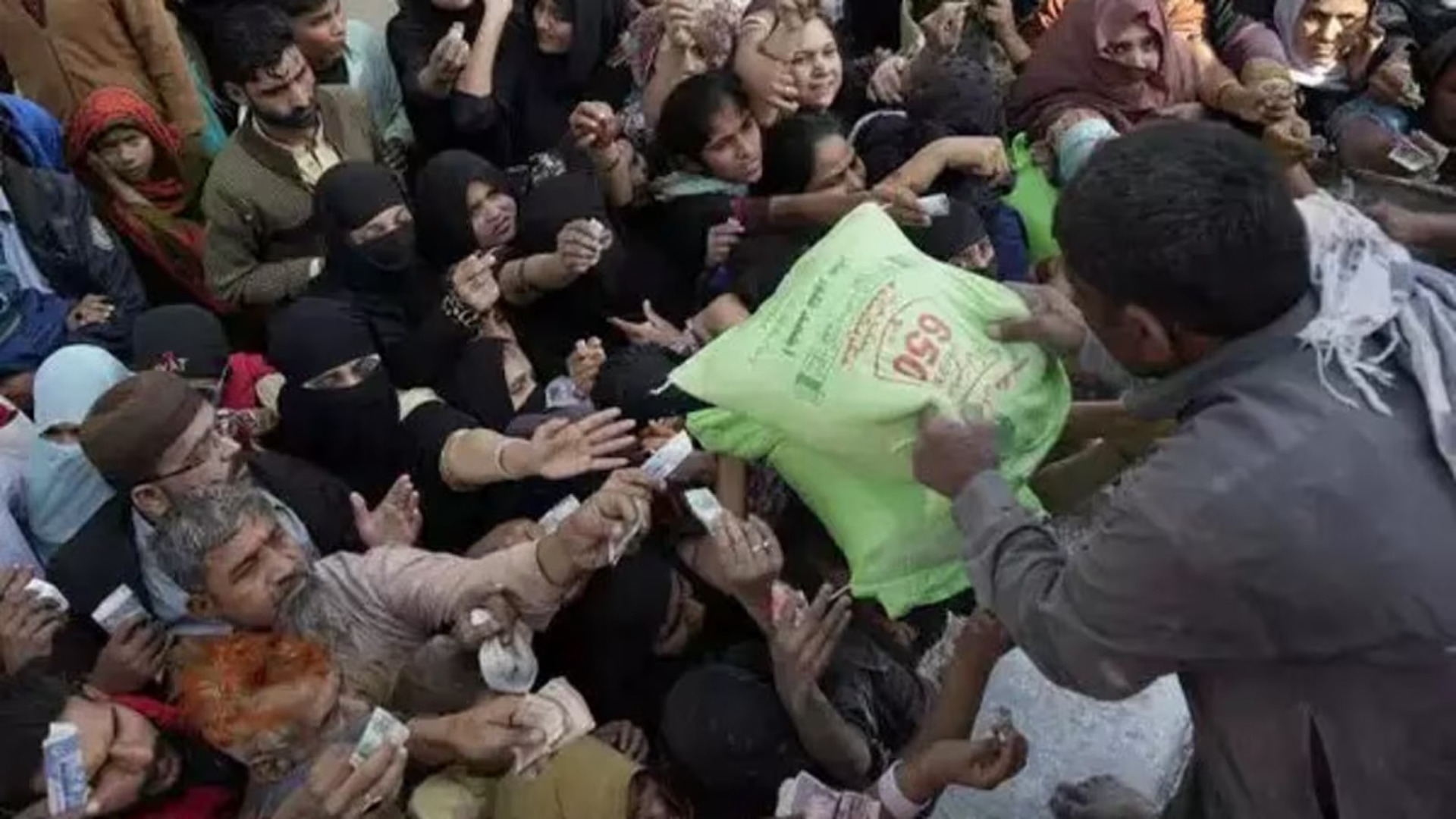This article is part of a series titled “Is there a way forward for Pakistan?”. Read more about the series here.
The status quo in Pakistan can no longer be sustained. This has been evident to many of us closely observing and analyzing the country’s economy. And while this is the most serious crisis to cohesion the country has faced since 1971, it is important to realize that building a political economy that works for the many, not just the few, is not as daunting a task as it may seem.
It is normal for people to expect that the way out of these crises – political, economic, and security – is complicated and near impossible to navigate. But this simply is not true, for Pakistan and its citizens have the ability, and more importantly the character, to build back better. Unfortunately, it is the ruling elites of this country that are standing in the way; if they were to get past their petty fights and extractive endeavors, the country could regain a sound footing both domestically and internationally.
To do so, Pakistan must follow these three steps: accept a new global reality, reform the domestic political economy, and swallow pride.
Understanding a changing global landscape
It is vital for Pakistanis, especially the ruling political and military classes, to realize that the world has fundamentally changed in the aftermath of the Covid pandemic. Things were already changing prior to this event, but the pandemic accelerated major trends, especially the sharpening rivalry between the United States and China, the end of the era of free money, and reorientation of global supply chains.
Changing geopolitics, economics, and trade patterns have made Pakistan’s post-1947 strategic orientation defunct. Efforts to evolve a new posture through the geoeconomics agenda pushed by the Khan government and Dr. Moeed Yusuf, his national security advisor, have had good intentions. However, these have only tinkered with things on the margins. Examples include focus on regions such as Central Asia, access to which will always be held hostage by the security situation in Afghanistan; indulgence of a radical regime in Kabul; maintaining an aggressive stance against India; poking in the eyes of the United States and Europe; and reinforcing the casino economy by amnesties given to real estate.
As if this was not enough, short-sighted domestic exigencies have inserted volatility in strategic ties with China and Saudi Arabia in particular, with interlocutors from both these countries (and the United Arab Emirates and Qatar) clearly signaling that the old way of doing business is no longer acceptable.
While Pakistan becomes increasingly reliant on the handouts from these key countries, it continues to follow policies that only trigger, if not anger, the very individuals and institutions who provide this much-needed financing. For example, while the Gulf monarchies encourage Pakistan to engage with India and consider some openness to Israel following the Abrahamic Accords, Pakistan’s ruling elites have not only said no, but created a spectacle for the sake of domestic brownie points.
At a time when geopolitical rents have dried up, global economics have also rapidly evolved, creating new risks for Pakistan. A core element of this shift is the end of the era of free money, a cycle that lasted from the end of the Global Financial Crisis to the end of the pandemic. With inflation exacting a toll on the global economy, central banks in developed markets, especially the United States, have raised rates. This has ended the reach for yield era, meaning that global bond markets are not eager to lend to emerging markets, especially those with weak fundamentals. As a result, countries like Egypt and Pakistan are on the brink, while Ghana and Sri Lanka have defaulted.
The era of free money also coincided with China’s ambitious Belt and Road Initiative, of which the China-Pakistan Economic Corridor is a key element. But countries that have binged on cheap debt, especially Chinese debt, are now facing a reckoning. Compounding these issues is a reorientation of Chinese policy, as the country’s ruling class looks inwards to recover from the fallout of the pandemic and a disastrous zero-covid policy.
Making things even more complicated is the changing geopolitical map, which means that the U.S.-led global financial institutions (broadly referred to as the Bretton Woods system) are not so eager to bail out countries that have binged on Chinese debt. The logic makes sense: running an international system has costs, especially in terms of restructuring the debts of countries that can no longer pay up. The West has been at it for a while and the thinking goes that if China wants to create an international order where it is in a leadership position, then it must bear the costs of running the system as well.
As a result, supply chains are in flux, and many are calling this the beginning of an era of deglobalization. Strategic competition, not economic efficiency, is now driving trade and investment policy, even if it comes at the cost of higher near-term prices and inefficiencies in global trade patterns.
India and Mexico, for example, have realized this shift, positioning themselves as countries that can help reduce China’s role as the world’s factory. This creates an opportunity for Pakistan, but for that opportunity to turn into real benefits, Pakistan’s ruling classes need to reorient the domestic economy.
Investments, not rents, need to be encouraged
For far too long, a kleptocratic elite has fattened itself on geopolitical rents. This has fueled a consumption-led economy for the few, leaving the many indebted, malnourished, and facing immense psychological trauma through high child mortality rates, injustice, and exclusion.
The way out requires Pakistan to reform its political economy, starting with three key steps: a complete overhaul of the taxation system, institutionalizing robust local governance, and ending the military’s role in the economy.
Research shows us that roughly $17.5 billion a year is given to Pakistan’s elites every single year. These handouts are at the core of the economic crisis being faced by Pakistan today and only an overhauled taxation system can resolve this core issue. For starters, the government must end this culture of relying on regressive taxes to meet its financing needs.
Real estate and agriculture must be taxed, and compliance must be pursued for everyone including retailers. In parallel, the bureaucracy must be overhauled so that it works for the many, not just itself and a select few.
The culture of perks and privileges for bureaucrats, military officers, judges, and politicians must come to an end. Subsidies provided to the rich, in the name of “relief” for common citizens, must be ended. And the savings from this upheaval, as well as the additional revenue generated by broadening the tax net, must be utilized to develop human capital and core infrastructure to build a productive, export-oriented economy.
The way out requires Pakistan to reform its political economy, starting with three key steps: a complete overhaul of the taxation system, institutionalizing robust local governance, and ending the military’s role in the economy.
This can only occur when power is devolved at the grassroots level, something the constitution demands. Effective local governance can not only create competition among localities for better service delivery, it can also help raise more resources and create a grassroots academy for the political class. In addition, improving core infrastructure, education, and healthcare can be more effectively done by local governments, as they are more likely to be held accountable by constituents voting for them.
Finally, the military’s role in the economy must be eliminated; the military’s publicly-listed and privately-operated businesses are highly disruptive to the economy. Pakistan’s armed forces run fertilizer plants, food companies, banks, and housing societies. This is preposterous and must end.
The military does not train its officers to be corporate executives and money managers. Economies in the twenty-first century require a specific set of executives and managers to run companies and retired or serving officials are not qualified to have a say in matters of the economy. The military, one could argue, has an economic interest given the scale of the institution. Even if one agrees with this argument, the economic interest is better served by professionally allocating the institution’s capital such that it generates optimal returns for its key stakeholders.
The military’s economic role also distorts markets and stunts the growth of the private sector. The influence and reach of military-owned businesses give them a leg up compared to the private sector. In addition, they do not operate in a way that maximizes shareholder value, making the economy less efficient across the board. Finally, the military’s economic footprint yields greater political influence, and as we have seen in the last few years, these interventions have created recurring crises both at home and abroad.
Peace and normalization with India is a must
Finally, Pakistan’s ruling classes need to swallow pride and showcase a lot less bravado. While India may be run by a right-wing Hindu nationalist party, it is an economic success story and an emerging global power. Kashmir remains a dispute and is unlikely to be resolved anytime soon. But this does not mean Pakistan should explore normalization of economic and cultural ties with India, even if it means setting aside core disputes for the foreseeable future. This normalization, perhaps in the form of a long-term peace treaty, can create financial space for a country that is out of money. It can also lead to greater trade and integration with a booming economy, yielding benefits for ordinary citizens across Pakistan.
But doing so requires Pakistani elites – including a narrow segment of intellectuals in Islamabad — to accept a new global reality where India has far more to offer not only to the West, but also Pakistan’s strategic allies such as Saudi Arabia and the United Arab Emirates. Individuals who believe that keeping a hard stance on India will somehow benefit Pakistan or reduce India’s global standing are mistaken – the international community, including the West, ignored Chinese atrocities for years when investing in China was considered beneficial; the same is true for Saudi Arabia, Vietnam, and other authoritarian countries that have strong value propositions for the world (Pakistan’s own misdeeds were also ignored when it was needed as an ally).
Reform or perish
Following the above roadmap for close to a decade can usher in a new era of development in Pakistan, one that fulfills the ambitions and aspirations of the country’s 230 million citizens. In the near-term, however, this roadmap will lead to a loss of influence and money for the country’s narrow kleptocratic elite, and it is this elite that is firmly in control of the status quo. This kleptocratic elite must recognize that time is running out.
Either they voluntarily change course, or the impending collapse may force millions of citizens to take matters into their own hands. Many would say this can never happen. These naysayers should read history a bit more closely, starting with the breakup of Pakistan in 1971.

The writer is the director of the Pakistan Initiative at the Atlantic Council’s South Asia Center. He also is the Vice President at The Asia Group.

